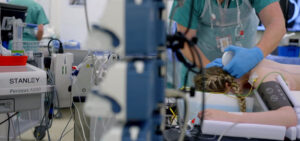
The Newcastle Hospitals Skills Academy is delighted to offer an exclusive, internationally quality assured course in the theory, methodology and delivery of Intraoperative Neuromonitoring (IONM) in collaboration with specialists from the Center for Electro Neurodiagnostics (CEN) – a US-based education and training organisation.
A cross Atlantic collaborative, this unique-to-the-UK IONM programme offers a rare opportunity to acquire the requisite knowledge, skills and experience to succeed in a rapidly growing, life-changing clinical specialty with a focus on neurophysiological monitoring during corrective spinal surgery.
Our IONM course – totalling up to 9 months – involves seven weeks of didactic teaching, including one day of simulation training, two weeks of hands-on experience involving between four and six spinal deformity cases hosted at Newcastle Hospitals followed by a number of months of continued training through assessments in your work-based operating theatres.
The typical duration to complete all requirements of this comprehensive programme is approximately six to nine months culminating in a Certificate of Intraoperative Neurophysiologic Monitoring with a focus on Spinal Deformity.
International expertise
Newcastle Hospitals is home to one of the UK’s leading centres of excellence for neurosciences with a global reputation for specialising in the diagnosis and treatment of conditions affecting the brain, spine, nervous system and neuro-genetics.
As well as neurosurgery, neurology and neuroradiology, neurosciences encompasses neurophysiology – a rapidly evolving field that uses diagnostic and monitoring modalities for the brain, spinal cord and nerves.
Intraoperative neurophysiological monitoring (IONM) allow highly skilled members of the healthcare science workforce to assess the function of vital neural structures during surgical procedures which present risk to the peripheral nervous system and spinal cord, ensuring they are conducted as safely and complication-free as possible.
Valued members of the operating theatre team, they interpret repeated electrophysiological measurements, sharing their findings in real-time with the surgical and anaesthetic teams to support their complex decision-making, which can significantly influence the outcome of surgery.
As Newcastle’s spinal specialists have years of experience using IONM during scoliosis corrective surgery, we are proud to offer this unique six to nine month programme in collaboration with US experts from the Center for Electro Neurodiagnostics.
Upskilling your staff
This course supports a key priority in the NHS to upskill staff, reducing the need to rely on outsourcing expertise from third parties and the considerable associated spend, and more importantly, optimising safer surgery for patients.
It provides delegates with the high quality, cutting edge knowledge and tools necessary to ensure a successful and satisfying, professionally recognised career in IONM.
Course lead
Dr James Blake, Clinical Scientist and Head of Clinical Measurement for Northern Medical Physics and Clinical Engineering at the Newcastle upon Tyne Hospitals NHS Foundation Trust leads the programme in partnership with the Center for Electro Neurodiagnostics.
It is facilitated by a leading team of highly qualified surgical neurophysiologists who have extensive experience monitoring thousands of routine and complex surgeries.
Course description
This exclusive programme provides students with a deep and broad knowledge base of IONM using a unique blend of virtual learning, and hands on practical training in one of Newcastle’s state-of-the-art simulation centres.
The online teaching is followed up by first-hand experience of live cases under the supervision of a highly qualified clinical scientist in a spinal operating theatre at Newcastle city centre’s Royal Victoria Infirmary.
The programme focuses on the following key components:
- Overview of IONM and required knowledge base
- Anatomy and physiology
- Monitoring basics and skills in the use of modalities and equipment
- Surgical techniques and their application
- Technical aspects of roles and behaviours such as critical thinking, teamwork, and communication.
The implementation of performance standards adjusted to the work environment, clinical setting and patient will also be covered in this course.
Learning outcomes
After successfully completing this course, delegates will:
- Have gained experience participating in various clinical situations involving complex decision making
- Obtained the skills and knowledge required to obtain employment in the field of IONM
- Have secured experience setting up neuromonitoring equipment and preparing patients for IONM
- Be able to recognize the differences between surgery and modality types, understand their applications, and have experience utilising them during both simulated scenarios and live surgical procedures
- Understand how to read and communicate neurophysiologic data to a remote supervising physician and surgical team.
Audience
This course is ideal for:
- Aspirational university graduates in a healthcare related specialty
- Ambitious employees of neurophysiology or similar departments who would like to explore a career practicing IONM or wish to hone their skills and gain an internationally recognised credential.
Eligibility
- Highly recommended: Bachelor’s degree in biology, neuroscience, electrical/electronic engineering, biomedical engineering, and/or a related area
- Acceptable: An degree in a related area, eg. physiotherapy. Please note that an additional formal examination and certification is required
- Workplace mentor with IONM expertise (workplace assessor)
- Prior experience or familiarity with operating theatres or IONM
- Ability to work as a team member in a high-pressure, challenging but endlessly rewarding environment.
Required materials
To successfully complete this course, you will access online course materials including the course itinerary, handouts, PowerPoint slides, and other resources that will be made available to you.